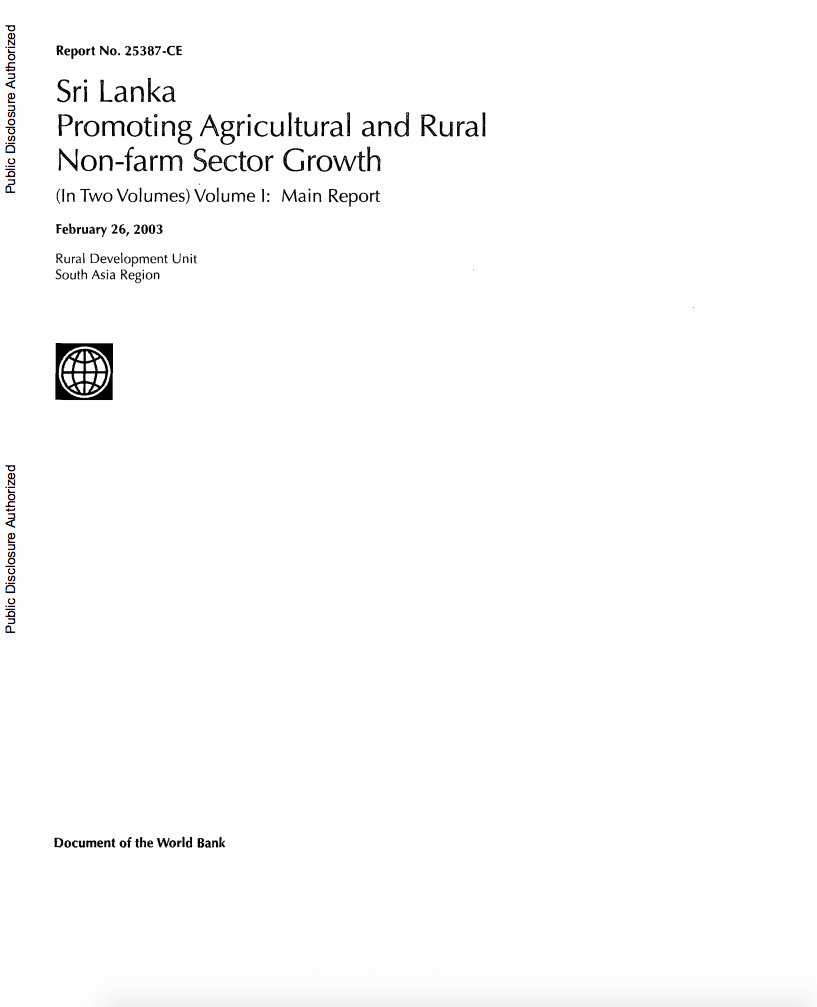The World Bank is a vital source of financial and technical assistance to developing countries around the world. We are not a bank in the ordinary sense but a unique partnership to reduce poverty and support development. The World Bank Group has two ambitious goals: End extreme poverty within a generation and boost shared prosperity.
- To end extreme poverty, the Bank's goal is to decrease the percentage of people living on less than $1.25 a day to no more than 3% by 2030.
- To promote shared prosperity, the goal is to promote income growth of the bottom 40% of the population in each country.
The World Bank Group comprises five institutions managed by their member countries.
The World Bank Group and Land: Working to protect the rights of existing land users and to help secure benefits for smallholder farmers
The World Bank (IBRD and IDA) interacts primarily with governments to increase agricultural productivity, strengthen land tenure policies and improve land governance. More than 90% of the World Bank’s agriculture portfolio focuses on the productivity and access to markets by small holder farmers. Ten percent of our projects focus on the governance of land tenure.
Similarly, investments by the International Finance Corporation (IFC), the World Bank Group’s private sector arm, including those in larger scale enterprises, overwhelmingly support smallholder farmers through improved access to finance, inputs and markets, and as direct suppliers. IFC invests in environmentally and socially sustainable private enterprises in all parts of the value chain (inputs such as irrigation and fertilizers, primary production, processing, transport and storage, traders, and risk management facilities including weather/crop insurance, warehouse financing, etc
For more information, visit the World Bank Group and land and food security (https://www.worldbank.org/en/topic/agriculture/brief/land-and-food-security1
Resources
Displaying 2296 - 2300 of 4907Measuring and Apportioning Rents from Hydroelectric Power Developments
This paper deals with economic rents
arising from the development of hydroelectric generation on
international watercourses. The paper briefly defines the
concept of economic rent and its application to
hydroelectric developments. It explores two areas of
precedents that shows how the concept could be applied in
developments on international watercourses. First, it looks
at international law on the ownership and rights of use of
Sri Lanka : Promoting Agricultural and Rural Non-farm Sector Growth, Volume 1. Main Report
Economic development has brought about,
the decline in contribution of the agricultural sector to
the economy of Sri Lanka, and, consistent with this economic
transformation, the structure of employment also changed.
Thus, as labor migrates away from agriculture, the
productivity, for those who remain in the land, needs to
increase significantly. This report examines the constraints
to promoting more rapid agricultural, and rural non-farm
Agriculture in Nicaragua : Promoting Competitiveness and Stimulating Broad-Based Growth
The report reviews basic growth, as
being one of four pillars for Nicaragua's poverty
reduction strategy. The well-being of the rural poor will
continue its dependence on - to a great extent -
agriculture. The study analyzes main agricultural
development aspects, and stipulates the broad basic growth
may be enhanced by strengthening agricultural
competitiveness. Yet, export growth is key to economic
Uruguay : Maintaining Social Equity in a Changing Economy
This report focuses on understanding key
issues related to poverty, vulnerability and social policy
in the context of a changing Uruguayan economy. Because the
country is highly urbanized (90 percent), and data on rural
areas are scant, most of the analysis in this study focuses
on urban areas. Chapter 1 presents a profile of poverty and
its trends in the nineties using household survey data.
Chapter 2 looks at changes in the structure of the economy
Dominican Republic - Poverty Assessment : Poverty in a High-Growth Economy, 1986-2000, Volume 1. Main Report
Since its recovery of macroeconomic
stability in 1991, the Dominican Republic has experienced a
period of notable economic growth. Poverty has declined in
the 1990s. Nevertheless, a segment of the population-mainly
in rural areas-does not seem to have benefited from this
growth. Poverty in this country in 1998 is less than that of
other countries if one adjusts for the level of economic
development. The principal poverty characteristics are the







